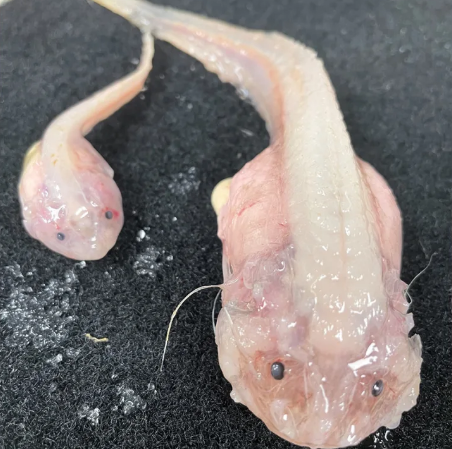This scientific discovery is a new low for marine researchers.

While travelling through several deep trenches off the coast of Japan in the northern Pacific Ocean, scientists captured footage of a snailfish swimming 8,336 meters below the surface, the deepest depths ever recorded.
Researchers from the University of Western Australia (UWA) and the Tokyo University of Marine Science and Technology (TUMST) released the video on Monday.
In the footage initially recorded by an unmanned submersible in September, an “extremely small” young snailfish is seen swimming just above the seabed in the Izu-Ogasawara Trench. The species of the snailfish is unknown but belongs to the genus Pseudoliparis, scientists reported.
A few days after the initial discovery, researchers set another record, this time in the Japan Trench, when they captured two snailfish from a depth of 8,022 metres. The two snailfish were later identified as the species Pseudoliparis belyaevi.

Get breaking National news
This was the first time a fish was ever caught from depths greater than 8,000 metres.

The two gelatinous-looking snailfish from the Japan Trench are translucent and do not have scales. Their eyes are small likely because of the pitch-black environment in the trenches, where pressure is also very intense.
Before this discovery, some scientists believed it may have been impossible for fish to survive at depths beyond 8,200 metres.
The two record-breaking discoveries were made as part of a two-month long expedition through the Japan, Izu-Ogasawara and Ryukyu trenches, at respective depths of about 8,000, 9,300 and 7,300 metres.
The autopiloted submersible vehicle, called a lander, used baited cameras to attract potential fish in the deepest parts of the trenches.
“The Japanese trenches were incredible places to explore; they are so rich in life, even all the way at the bottom,” UWA professor and chief scientist of the expedition Alan Jamieson said in a press release.
“We have spent over 15 years researching these deep snailfish; there is so much more to them than simply the depth, but the maximum depth they can survive is truly astonishing.”
“The real take-home message for me, is not necessarily that they are living at 8,336m but rather we have enough information on this environment to have predicted that these trenches would be where the deepest fish would be,” Jamieson continued. “In fact until this expedition, no one had ever seen nor collected a single fish from this entire trench.”
Jamieson and his team are exploring the trenches as part of a ten-year study into the fish found at the most severe depths in the world.
Before this expedition, the deepest swimming snailfish was observed in 2008 in the Mariana Trench — the deepest oceanic trench on Earth — at 7,703 metres, 158 metres above the new titleholder. Jamieson said the snailfish populations are more “abundant” in the trenches around Japan.
Snailfish, members of the Liparidae family, are found in both shallow and deep waters. They can grow up to a maximum length of about 30 centimetres and do not have a swim bladder, a gas-filled organ that aids many fish species in controlling buoyancy.








Comments
Want to discuss? Please read our Commenting Policy first.